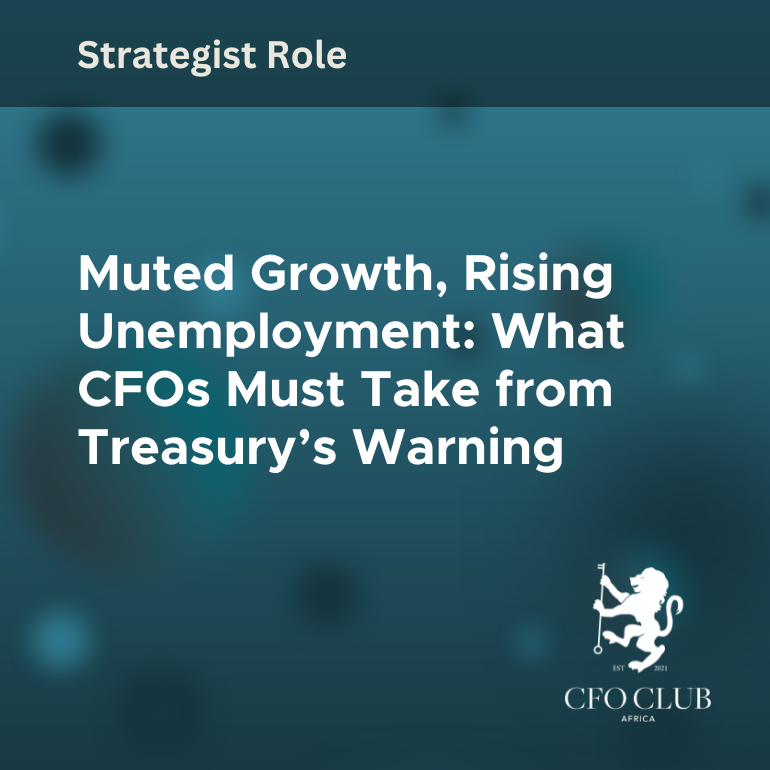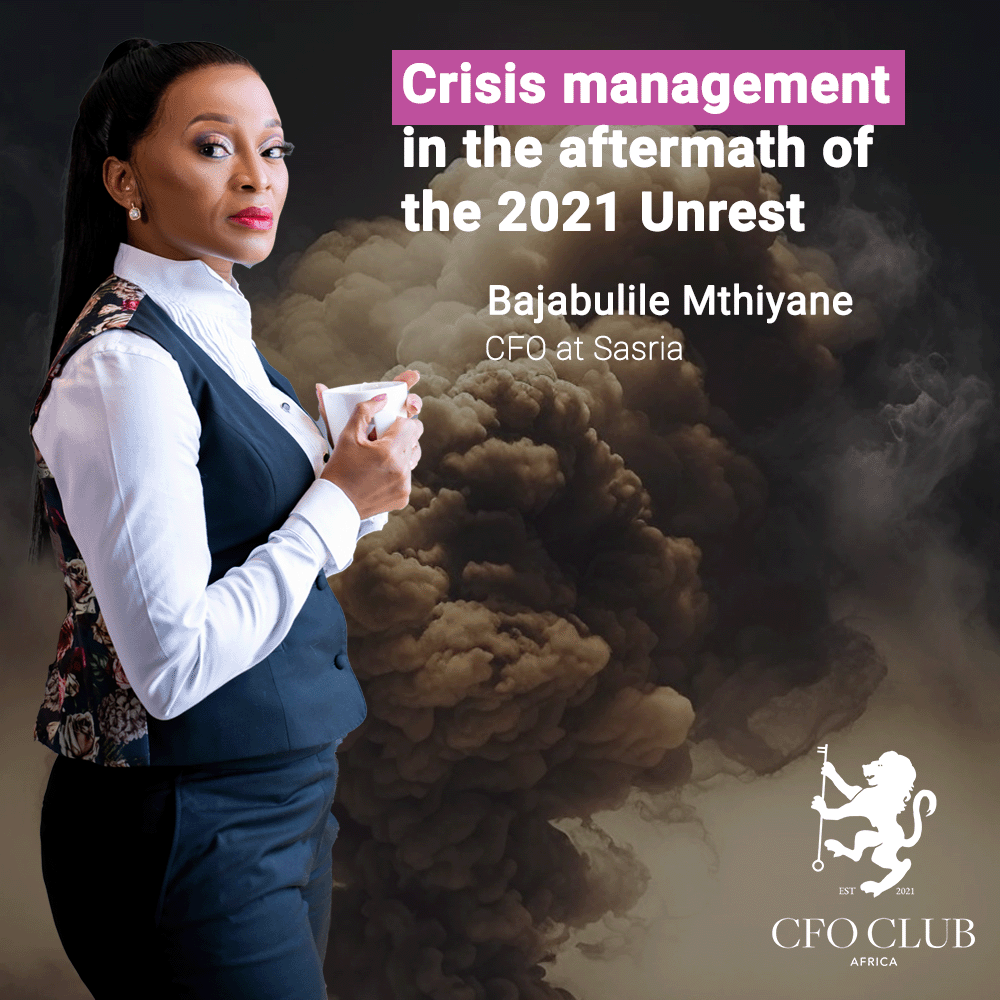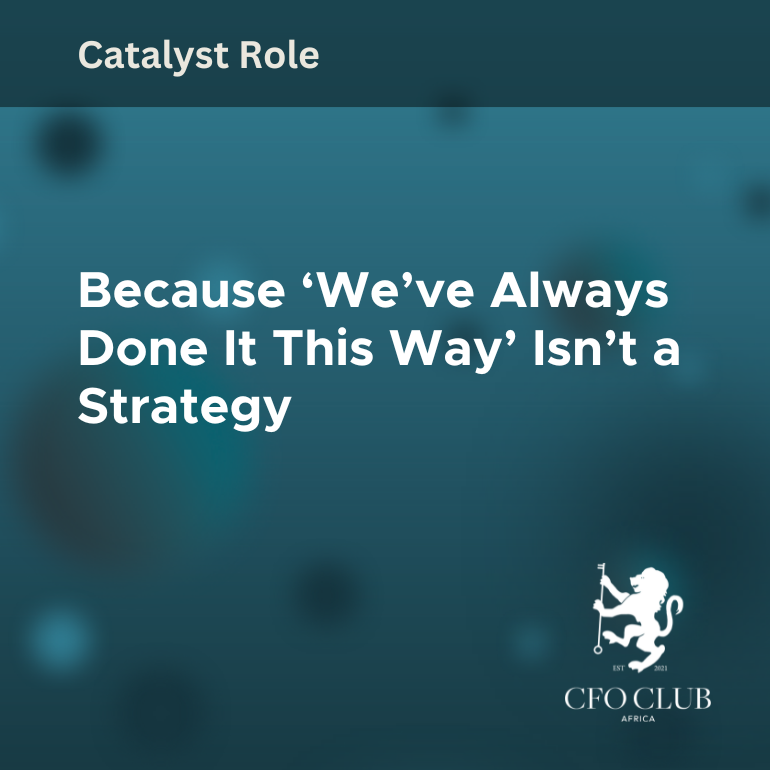Muted Growth, Rising Unemployment: What CFOs Must Take from Treasury’s Warning
When Finance Minister Enoch Godongwana addressed the Macro Fiscal Workshop this past week, his message was direct: South Africa is entering a difficult period marked by muted economic growth, stubbornly high unemployment, and limited fiscal space. These headwinds are not confined to government. They ripple into the private sector and directly shape the decisions finance leaders must make. For CFOs, the implications are profound.
The remarks came ahead of the Medium-Term Budget Policy Statement (MTBPS), which will be tabled on 12 November. The MTBPS sets the parameters for the three-year expenditure framework and signals the government’s fiscal priorities. But even before the numbers are presented, the themes outlined by Treasury hold lessons for business leaders who must navigate the same realities: low growth, weak demand, constrained funding, and pressure to deliver credibility in an environment of uncertainty.
The Growth Conundrum
The South African economy has struggled to maintain momentum for more than a decade, with growth consistently underperforming population expansion. Godongwana acknowledged that sluggish activity complicates revenue collection. Without stronger growth, the tax base stagnates, limiting the state’s ability to fund development priorities.
For CFOs, this mirrors the challenge within their own organisations. Revenue growth cannot be assumed. Traditional markets may no longer deliver the same returns, and efficiency gains alone cannot carry long-term strategy. Finance leaders must ask: where can new growth be found? This requires looking beyond incremental improvements and identifying opportunities in regional expansion, digital models, or sector diversification.
Low growth is not only a government problem — it is a business continuity issue. Organisations that anticipate the implications and invest early in innovation, partnerships, and resilient business models will be better positioned than those that remain tied to past patterns.
Unemployment and Social Pressures
The unemployment rate has crept up again, rising to 33.2% in the second quarter of 2025. That translates to 8.4 million South Africans actively seeking work, with youth unemployment even higher. This reality has both direct and indirect consequences for companies.
On the demand side, weak household income means subdued consumer spending, delayed purchases, and heightened credit risk. On the supply side, businesses face the long-term erosion of skills and productivity when millions are excluded from the workforce.
For CFOs, this creates a twofold responsibility. Firstly, to factor consumer fragility into revenue forecasts, pricing models, and risk assessments. Secondly, to see workforce investment as a strategic lever. Initiatives that strengthen training pipelines, build partnerships with technical colleges, or create meaningful employment opportunities are not only acts of social responsibility but also investments in long-term market stability.
Treasury’s warning underlines a truth CFOs already know: a business cannot thrive in a failing society. Employment creation and inclusive growth must be integrated into corporate strategy, not left as afterthoughts.
Debt and Fiscal Credibility
Godongwana drew attention to the growing debt burden. South Africa can still borrow, but only to the extent that debt remains serviceable. The Minister noted that international lenders such as the IMF come with conditions — reduced salary bills, trimmed social spending, and limits on government discretion. For the state, protecting fiscal credibility is non-negotiable.
CFOs face an identical balancing act. Leverage can fuel growth, but unsustainable borrowing erodes investor trust and limits strategic flexibility. Just as Treasury cannot rely indefinitely on bailouts, companies cannot paper over weak fundamentals with additional debt.
Maintaining financial credibility requires rigorous capital allocation, transparent communication with stakeholders, and disciplined debt management. Investors, like credit rating agencies, are looking not only at financial performance but also at governance, disclosure, and long-term viability.
The lesson is clear: credibility is an asset that must be defended. For businesses, this means funding growth in a way that strengthens resilience, not compromises it.
Trade-Offs and Priorities
Perhaps the most striking point from Godongwana’s address was the reminder that choices have consequences. Over R20 billion has been diverted from education since 2008 to bail out struggling State-Owned Enterprises. Every allocation represents a trade-off.
CFOs make similar calls every budget cycle. Allocating capital to short-term fixes at the expense of strategic investment can leave organisations exposed. The temptation to divert funds to urgent problems is real, but finance leaders must keep sight of the longer horizon. Education, innovation, and infrastructure inside a business are equivalent to research and development, digital transformation, and talent development. These areas may not yield immediate returns, but neglecting them undermines future competitiveness.
Treasury’s admission that education and health have been underfunded is a cautionary tale for any finance leader: consistently prioritising bailouts over growth investment eventually erodes both trust and performance.
Political and Policy Uncertainty
The current parliamentary environment, without a single party majority, has added a new dimension of uncertainty. Traditionally, budgets passed with relative ease. Today, they are subject to negotiation, compromise, and potential delays.
For businesses, this translates into regulatory and policy uncertainty. Approvals may take longer. Reforms may stall. Incentives and tax regimes may shift. CFOs cannot control the political landscape, but they can control how their organisations prepare for it.
This is where scenario planning and sensitivity analysis become essential. What happens if tax rates rise? If incentives fall away? If energy reforms accelerate, or stall? CFOs must embed these possibilities into their financial models, ensuring that the organisation can adapt to a range of fiscal and policy outcomes.
Collaboration and Shared Responsibility
Finally, Godongwana emphasised the need for collaborative engagement between government, civil society, and business. Fiscal sustainability cannot be achieved by Treasury alone; it requires participation and innovation from the broader economy.
CFOs are uniquely placed to lead this dialogue from the business side. Their role extends beyond financial stewardship into shaping how their organisations contribute to national objectives. Whether through infrastructure partnerships, energy investment, or skills development, CFOs can align corporate strategy with national imperatives in ways that benefit both the company and the country.
Looking Ahead
The MTBPS in November will provide detailed numbers, but the direction is already clear. South Africa faces a constrained fiscal future shaped by low growth, high unemployment, and mounting debt. For CFOs, this is not a distant concern but a current operating environment.
Finance leaders who respond by cutting costs alone will find themselves increasingly constrained. Those who respond by positioning their organisations for resilience, credibility, and inclusive growth will be better prepared for what lies ahead.
In times like these, the role of the CFO is not merely to manage the numbers but to interpret the wider economic signals and embed them into strategy. Treasury has sounded the warning. The challenge now is how business leaders choose to respond.





